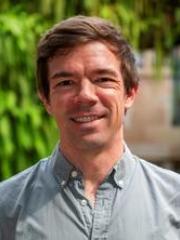Dr William Defliese

Researcher biography
I am a sedimentary geochemist, and I work on a variety of problems in sedimentary geology, paleoclimate, and basin analysis through the use of petrology, elemental geochemistry, and stable isotope geochemistry. I run the Carbonate Research and Geochemistry group at UQ, where we have a variety of facilities for sample petrology, carbonate precipitation under controlled environmental conditions, and geochemical analysis. I am also heavily involved with ANZIC, the Australian/New Zealand branch of IODP/ICDP, where I serve on the Science Committee.
Clumped Isotope Reordering and Basin Analysis
Currently we are investigating clumped isotope reordering - the change that occurs in a sample's clumped isotope value as a result of solid-state diffusion of 18O and/or 13C within the crystal lattice of a carbonate mineral. This is important to understand for two reasons. First, if we are trying to get accurate paleoclimate data using clumped isotope paleothermometry, we need to know what conditions (burial depth and heating) allow for primary signals, and under which conditions the primary signal is lost. Second, if we know the kinetics of clumped isotope reordering, we can then apply that knowledge to understand past heat flow in a basin. Combined with a stratigraphic column and burial history for a body of rock, we can reconstruct geothermal gradients, and evaluate tectonic/basin models based on whether they could produce the required heat flux to match observed clumped isotope values. Areas of active research include precipitating model carbonates in the lab to study the effects of different cations, burial diagenesis, and applications to sediment hosted ore bodies/other economic systems.
Carbonate Sedimentation and Diagenesis
Carbonate sedimentation and diagenesis is one of our active research areas, with a focus on combining laboratory experiments, modern analogues, and ancient rocks to understand the long term evolution of carbonates and other sediments. Clumped isotopes are useful here as it turns out they do record the temperature of formation in most cases, and can be applied to a variety of problems, such as contemporary dolomite formation, or the temperature of formation of otherwise engimatic carbonate textures, such as 'beef' calcites. We are also interested in the sedimentation and diagenesis of carbonate reefs, such as the geological history of the Great Barrier Reef, and are currently studying the halogen composition of carbonates, reef rocks and corals, and oceanic sediments in general (see below).
Halogens in Sediments and Carbonates
Anions are undercharacterized in Earth materials, largely due to measurement difficulties. At UQ, we have developed combustion ion chromotography to characterize the halogen abundance in sediments and carbonates. The goal is to determine the overall halogen budget in the oceans and oceanic sediments, as while we know a lot about cation and trace element distributions in oceanic sediments, little is known about halogens. Likewise, halogens in carbonate may be potential paleoenvironmental proxies, but have not been investigated thouroughly. This is something I am pursuing, with collaboration from ANZIC/IODP.
Paleoclimate Research
I have been interested in paleoclimate since I took my first geology class at Northwestern. Since then, I've worked on a variety of timescales and systems, but the common theme has been the application of stable isotopes and clumped isotopes. Clumped isotopes are a wonderful tool for paleoclimate research in situations where the water oxygen isotope composition is uncertain, such as terrestrial and lacustrine settings, deep time where even the oxygen isotopic composition of the ocean is uncertain, or even in (relatively) more modern systems that might be affected by runoff or glacial meltwater. Active projects and areas of interest include Holocene climate change/ENSO, Southern Ocean Cenozoic paleoclimatology, and 'bizzare' climate events such as the Neoproterozoic Snowball Earth glaciations.
Degrees and Positions Held
2008 B.A. Geological Sciences and Integrated Sciences (Honors), Northwestern University, Evanston, Illinois, USA
2014 Ph.D. Geology, University of Michigan, Ann Arbor, Michigan, USA
2014-2017 Postdoctoral Researcher, University of California, Los Angeles, California, USA
2017-2019 Berg-Hughes Postdoctoral Fellow, Texas A&M University, College Station, Texas, USA
2019-2024 Lecturer in Geochemistry, University of Queensland
2025-Present Senior Lecturer in Geochemistry, University of Queensland

